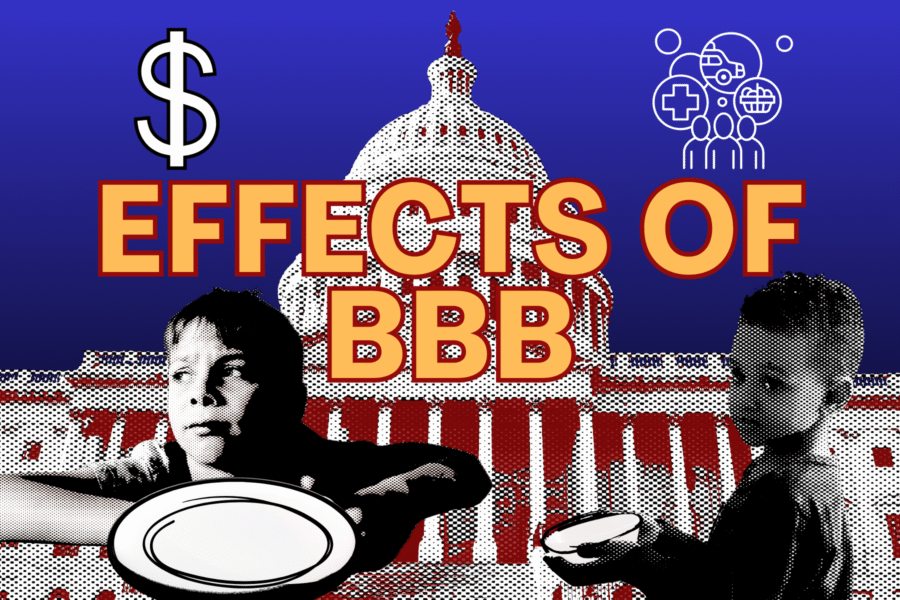By Theo Meranze
A little over a week ago Trump’s Big Beautiful Bill (BBB) was officially signed into law. It is likely the most consequential piece of economic legislation in recent memory, with stark implications for nearly every person in the country. It includes large cuts and changes to integral programs such as Medicaid, Medicare, and SNAP. The bill is intentionally large, 887 pages to be exact. Due to its density it has been hard for the public to keep up with all of its implications. Our goal with this blog is to help summarize its effects, particularly for people with disabilities.
Cuts And Changes To Medicaid And Medicare
Medicaid, a government funded healthcare program which in California is called Medi-Cal, will be subject to a large amount of changes and cuts in funding, in part due to eligibility requirements being changed. According to a comprehensive article published by The Center for American Progress,
“The nonpartisan Congressional Budget Office (CBO) estimated that the OBBBA will cut federal spending on Medicaid and Children’s Health Insurance Program (CHIP) benefits by $1.02 trillion, due in part to eliminating at least 10.5 million people from the programs by 2034. With new federal limits on Medicaid eligibility likely increasing the number of uninsured, along with other provisions that restrict states’ ability to raise revenue to fund their Medicaid programs, states will have to reevaluate their budgets to either supplement the spending or cut services.”
People with disabilities, particularly those who are working and middle class, will undoubtedly be affected by this loss of funding. While it is unclear how California will specifically attempt to rearrange things to compensate for this loss in funds, there will unavoidably be large repercussions. Even if there are no cuts to programs specifically aimed at helping people with disabilities, hospitals will be closed and staff will be cut. These funding changes will go into play in 2028.
There are also new work requirements for Medicaid that will go into effect. Adults — defined as people between the ages of 19-64 – will have to work at least 80 hours a month to qualify for medicaid coverage. The bill does leave room for exemptions for people with dependent children and disabilities that interfere with their ability to work, but it is unclear how this will be judged or enforced. This nationwide work requirement will go into effect in January of 2027.
There will be out-of-pocket fees of up to 35$ for adults on medicaid if their incomes are between the federal poverty level (this year, $15,650 for an individual) and 138% of that amount ($21,597). This change won’t go into effect until October of 2028. These fees, in combination with the new work requirements, will make it much harder for people to access medicaid.
Medicare, a government funded health insurance program which mostly covers people over the age of 65 and people with disabilities, will also be harmed by this bill. According to The Center for American Progress,
“The OBBBA prohibits the implementation of two finalized rules until October 1, 2034. The rules would have made it easier for very low-income Medicare enrollees to access Medicare Savings Programs (MSPs), which help cover premiums and cost-sharing for their Medicare benefits. This will disproportionately affect disabled people, as they are more likely to have lower incomes than nondisabled people. Second, the bill eliminates Medicare eligibility for people with lawful immigration status who have already paid into the program. Lastly, according to the CBO, absent future congressional action, the bill will trigger $490 billion in cuts to Medicare from 2027 to 2034 due to the Statutory Pay‑As‑You‑Go Act of 2010.”
As in the case with the Medicaid cuts, the specific implications of these broad changes in California are unclear. It will be up to state government to figure out how to attempt to compensate for these losses. Regardless, people with disabilities will undoubtedly be affected by these changes.
Cuts And Changes To SNAP
SNAP, or the Supplemental Nutrition Assistance Program, will also be subject to drastic cuts and changes. Formerly known as the food-stamp program, SNAP provides food-purchasing assistance to low income families around the country. The cuts in the BBB will reduce nutrition funding, which includes SNAP, by around $186 billion between 2025 and 2034. This will have wide reaching effects on anyone who relies on SNAP, including people with disabilities. Students who are eligible for SNAP may also see cuts in school meals and in summer EBT, or electronic benefits transfer, food benefits, according to CBPP. The bill also limits SNAP eligibility to U.S. citizens and lawful permanent residents.
There will also be expanded work requirements for SNAP. At the moment many people are limited to three months of SNAP benefits every three years unless they are working for 20 hours per week or qualify for an exemption. With the passage of the BBB, these requirements will be expanded to include people ages 55 through 64, parents of minor children ages 14 and up and veterans. While this won’t affect students directly, it will affect their parents. It is unclear when this will officially go into effect.
Overall, while the way these cuts and changes will go into effect on the ground is unclear, they are undoubtedly dangerous, particularly for people with disabilities and the most vulnerable. It is up to us as a community to take advantage of their delayed implementation to advocate for policies and fund allocation on a state level that will help stop the worst of the damage done by the federal government.
We will continue to provide you updates as the situation develops.
Latest Post:

